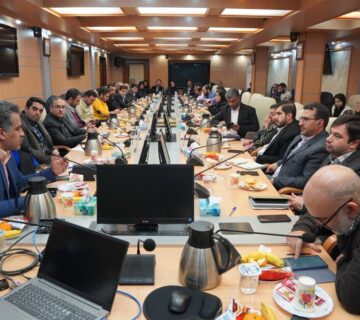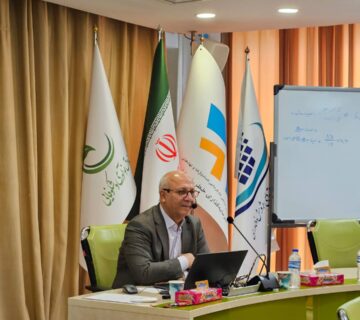A strategic roundtable of the Venture Capital Commission was held with the participation of key players in the field and senior executives from venture capital firms. The session was hosted by Pasargad Venture Capital and attended by Ms. Mahbubeh Elmieh, the company’s CEO. During the meeting, Mr. Mohammad Hossein Sajadi Niri, Chairman of the Board of the Iran National Venture Capital Association, presented a report on the association’s activities over the past year.
Key topics discussed included an assessment of the association’s achievements, a review of legal and operational challenges in venture investment, and the evolving role of banks and financial institutions in advancing this investment model.
Presentation of the Association’s Annual Report
At the start of the session, Mr. Sajadi Niri highlighted the upward trend in venture capital activity in the country. He emphasized that one of the core missions of the association is to raise awareness and foster effective connections among members to improve investment conditions in the innovation ecosystem.
Stressing the importance of continuous engagement with members, he stated:
“Participants in this domain must actively engage in networking. As a professional and representative body, the association can only build capacity and respond to member needs through collective cooperation.”
He underscored the need for recording and documenting investment processes and producing transparent reports. He added that if these reports are validated by international institutions, Iran’s global standing in venture capital rankings would improve. He also noted that efforts are currently underway to have the association’s latest report recognized by international bodies.
Challenges in the Venture Investment Landscape
A central topic of discussion was the financial, legal, and operational barriers faced by VC funds and affiliated entities. Mr. Sajadi Niri remarked:
“Tax and legal constraints have been raised repeatedly in various sessions. Our aim is to collaborate with governmental bodies to remove these barriers.”
He also highlighted the association’s recent engagement with public policymakers:
“Following recent administrative changes in key economic bodies, we’ve been holding meetings to explore innovative financial models and new approaches to develop the innovation ecosystem. We are also designing joint investment models between the private sector and government.”
Legal Capacities of Banks in Technology Investment
Ms. Elmieh then referenced Article 18 of the Knowledge-Based Production Leap Law, which permits banks and financial institutions to directly invest in technology and innovation projects.
She explained that prior to this legal provision, banks were restricted from making direct investments:
“Now, with the implementation of Article 18, banks can engage in joint investments through collaboration with innovation and research funds.”
She also shared the initiatives of Bank Pasargad, which has launched a private investment fund as a new approach for entering innovation-driven and tech-focused sectors.
Venture Investment Enters the Agriculture Sector
Another key part of Ms. Elmieh’s remarks focused on the role of technology in agriculture and food security. Citing trade statistics, she stressed the need to leverage innovation to enhance agricultural performance.
She stated:
“Successful international case studies clearly demonstrate how technology has been pivotal in boosting productivity and exports. Venture capital in agriculture could bring about significant transformation.”
She added that Pasargad VC is planning to expand its focus on agricultural value chains and is actively identifying promising investment opportunities in this area.
At the close of the session, participants emphasized the importance of stronger collaboration between the Iran National Venture Capital Association, financial institutions, and private investors. Key proposals raised included:
- Preparing transparent and detailed reports on VC performance to improve Iran’s international rankings;
- Expanding networking among association members to facilitate knowledge and experience sharing;
- Increasing interaction with government entities to simplify regulatory procedures.
The recent session of the Venture Capital Commission provided a platform for stakeholders to exchange views and discuss effective strategies for expanding VC in Iran. The gathering featured a review of the association’s performance, challenges in policy and regulation, new legal frameworks, and emerging areas for innovation-driven investment such as agriculture.
As a professional association, the Iran National Venture Capital Association serves as a communication hub, a platform for addressing shared issues, and a bridge to policymakers—helping shape a more transparent and growth-oriented investment environment in the innovation ecosystem.
Such meetings are part of the association’s broader strategy to strengthen collaborative dialogue and develop practical solutions to enhance venture and technology investment across the country




No comment